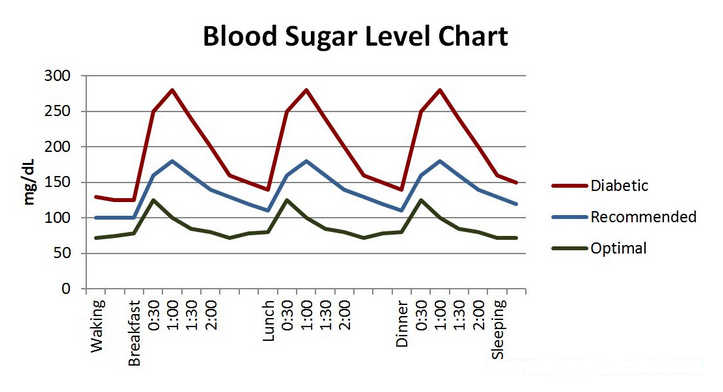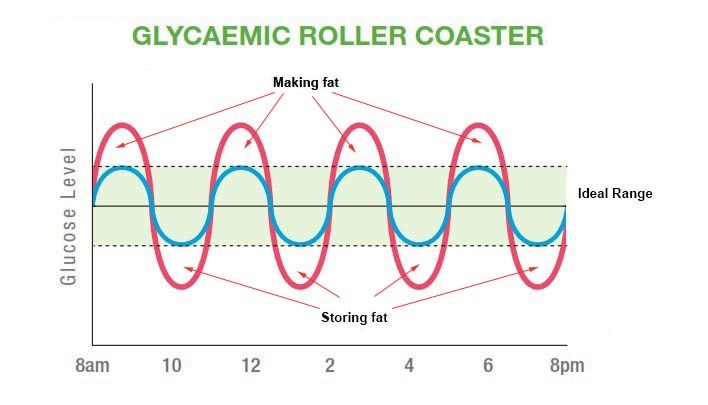
Weight gain is epidemic in the South Africa, with over 70% of women being overweight or obese (this is the highest in Africa). Even more frightening is that 13% of our children are overweight or obese (this is more than double the world average!).1 Being overweight increases the risk of cancer, heart disease, diabetes, Alzheimer’s and dementia, respiratory problems, osteoarthritis and depression.2 The cost is enormous, not only in rands but also in pain and suffering.
Fad diets and weight loss products have proliferated, but don’t bring lasting results. Part of the problem is that few people understand the link between blood sugar levels and weight gain.
The starting place to controlling weight is the awareness of being overweight. Unfortunately in our country being ‘well padded’ is seen as desirable in some groups. Sadly this refers primarily to women, which impacts the children, as it’s the women who determine what the family eats.
A simple way to check if you’re overweight is to check your Body Mass Index. To do this, simply take your weight and divide it by your height, squared. So if you weigh 95kg and you’re 1.8m tall the equation would be 95 ÷ (1.8 x 1.8) = 29.32. Looking at the table below you’ll see that you are very much overweight.
BMI Table.
Underweight = less than 18.5
Normal weight = 18.5-24.9
Overweight = 25-29.9
Obesity = BMI of 30 or greater
The Mechanics Of Blood Sugar And Weight Gain
Sugars and starch (refined carbohydrates – e.g. white flour {bread, pasta, cakes, cookies etc} white rice, breakfast cereals, etc.) are quickly converted into glucose in the body and absorbed into the bloodstream. Excess glucose damages our veins and capillaries, so the body tries to regulate levels in the bloodstream throughout the day. It does this by secreting insulin from the pancreas which stimulates the cells to absorb glucose. Ideally, our blood sugar levels should remain within a certain range, not fluctuating too high or too low. Unfortunately, poor eating habits cause our levels to spike too high and drop too low (see diagram).
When we wake up in the morning, our blood sugar levels are naturally low. A breakfast loaded with sugar and refined carbs immediately causes a spike in these levels. Remember that sugar is hidden, in various forms, in every processed and packaged food, it’s not just the teaspoons of sugar we add to our coffee and cereal. Our bodies will react by producing insulin to lower the blood sugar levels.
By mid morning our sugar levels have dropped and we experience that ‘mid-morning slump’. A cookie and coffee send our blood sugar levels skyrocketing again. Insulin rushes to the rescue, causing levels to drop too low.
And so it goes throughout the day, this roller coaster of high and low blood sugar levels.
Normally, the sugar is converted to energy and excess is stored in the liver and muscles3, to be converted into energy later. But when the levels are constantly high, our bodies convert the excess glucose into fat –so we’re making fat.
When blood sugar levels are low, our bodies store the fat and hold on to it.
So we go through the day – making and storing fat, as illustrated below!

Another factor that comes into play is leptin, the hormone that signals your brain to give you a feeling of fullness. Elevated blood sugar levels have been shown to interfere with leptin’s ability to signal the brain, so we tend to eat too much and gain weight.4
Furthermore, prolonged raised blood sugar levels stress the body5, leading to elevated cortisol levels. This also leads to weight gain6.
Is it any wonder that so many people struggle with their weight?
The Solution
If we can keep our blood sugar levels constant throughout the day, our bodies will utilize all the glucose for producing energy. It won’t be converted into fat and stored! Existing fat stores will begin to be used for energy production and weight loss will be automatic. More importantly, you won’t regain weight!
The most important way we can do this is by ensuring that we eat a healthy diet consisting primarily of low Glycaemic Index (GI) foods. GI refers to a food’s effect on blood sugar levels. Low GI foods release their sugars slowly, avoiding sugar spikes in the blood.
Click on the following link for a handy table of food GI values – https://www.health.harvard.edu/diseases-and-conditions/glycemic-index-and-glycemic-load-for-100-foods
It’s very important to eat breakfast each morning. When we wake up, our blood sugar levels (fasting levels) are naturally low. A healthy breakfast will supply our body with a steady flow of glucose, enabling all our organs and brain to start functioning efficiently. Make sure you include some good quality protein, it slows the absorption of sugar into the bloodstream.
Rather eat 5 small meals a day than just one or two large ones. This will help to keep your blood sugar levels constant and avoid the spikes and lows. A good idea is to have a healthy breakfast, lunch and supper and have a small, healthy snack in between. Snack on nuts, apples, pears, seeds and energy bars (make sure they only contain low GI, organic ingredients).
Drink at least 8 glasses of good quality water each day. Not only will it help you lose weight,7 it also helps your body flush toxins, helping to increase energy levels.
Some Foods That Help Reduce Blood Sugar
Rolled Oats Oats contain a mixture of soluble and insoluble fiber (especially beta-glucan) which slow the release of sugar into the bloodstream. Add a few spoons to a bowl, pour over some hot (not boiling) water and add chopped fruit, nuts, seeds and plain yogurt for a delicious, healthy breakfast.
Beans and Pulses Beans and pulses (peas, lentils, chickpeas, etc,) are excellent sources of good quality protein and dietary fiber. They’re inexpensive, easy to prepare and very versatile. Unlike meat, chicken and fish they aren’t contaminated with antibiotics and growth hormones.
Cinnamon Adding a teaspoon of cinnamon to teas, coffees, casseroles, oats etc., is beneficial. A review of studies8 showed that it helps to reduce blood sugar levels and another study9 that it helps prevent insulin resistance.
Leafy Greens In addition to having a very low GI, greens are excellent sources of vitamins, minerals and fiber.
Apple Cider Vinegar This has been shown to lower blood sugar levels and improve the cells sensitivity to insulin by up to 34%.10
Conclusion
Controlling our blood sugar levels can make it much easier to lose weight, maintain a healthy weight and helps reduce the risk of chronic disease.
For more health info go to the Health News page
References
1. https://www.health24.com/Diet-and-nutrition/News/nejm-obesity-study-shocking-results-20170612
2. https://www.cdc.gov/healthyweight/effects/index.html
3. https://www.ncbi.nlm.nih.gov/pmc/articles/PMC3248697/
4. https://www.ncbi.nlm.nih.gov/pmc/articles/PMC3379883/
5. https://www.ncbi.nlm.nih.gov/pubmed/10201642
6. https://www.ncbi.nlm.nih.gov/pubmed/16353426
7. https://www.webmd.com/diet/news/20100823/water-may-be-a-secret-weapon-in-weight-loss#1
8. https://www.ncbi.nlm.nih.gov/pmc/articles/PMC3767714/
9. https://www.ncbi.nlm.nih.gov/pmc/articles/PMC2901047/
10. https://www.ncbi.nlm.nih.gov/pmc/articles/PMC3714056/
2 Replies to “How Blood Sugar Levels Affect Weight Gain”